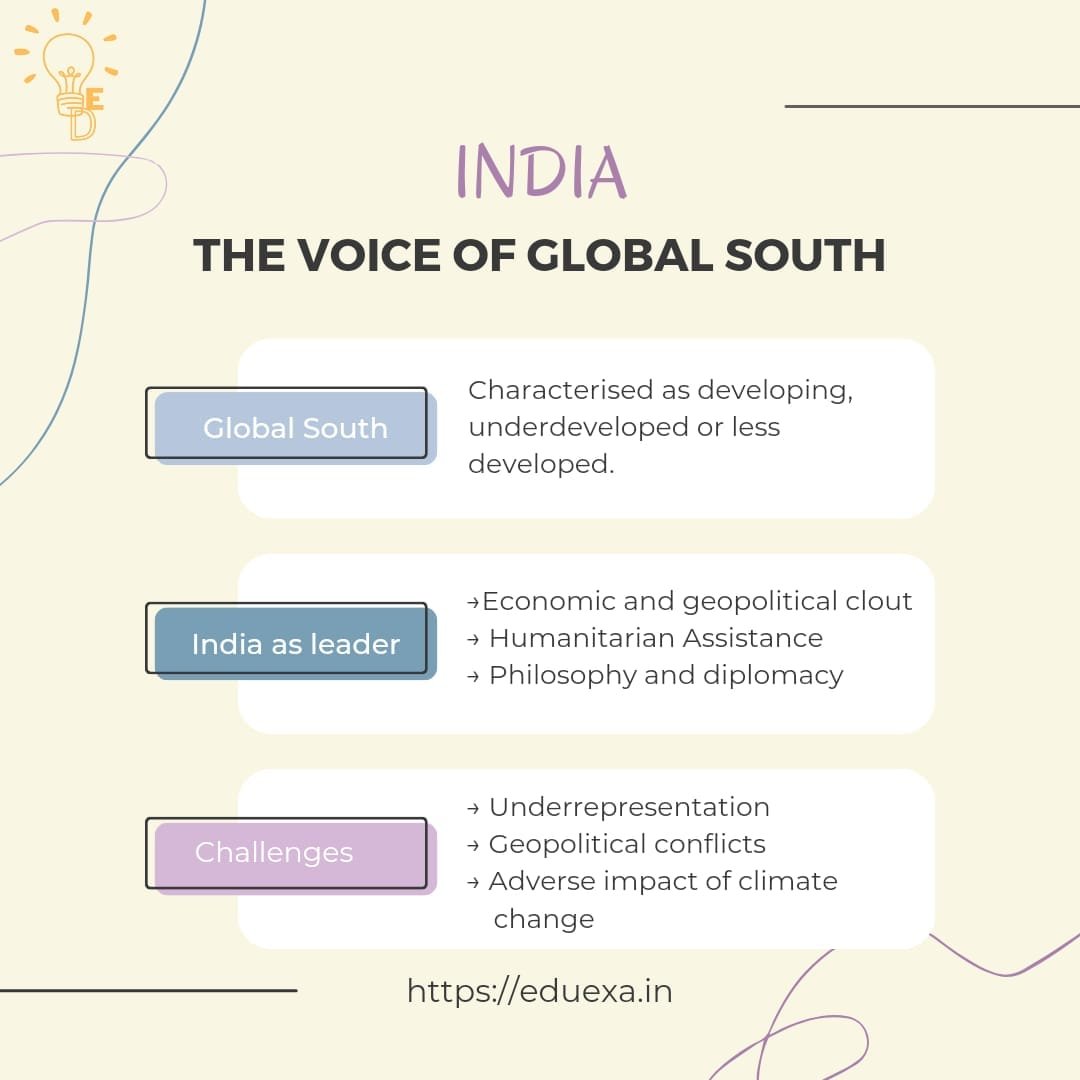India as Voice of Global South: Complete guide in 2024
What is Global south?
It refers to countries often characterised as developing, less developed, or undeveloped. These countries are primarily located in the Southern Hemisphere, largely in Africa, Asia and Latin America.
Similarly, economically developed countries such as the United States, Canada, Europe, Russia, Australia and New Zealand constitute Global North.
The concept of the Global South can be traced back to the Brandt Report of 1980, which proposed a division between North and South countries based on their technological advancement, GDP, and standard of living. Brandt line separates the global North from global South.
Challenges faced by the Global South
Underrepresentation in global forums :- Most of the global forums’ either do not have members of LDCs or their voting power would be marginal. Most of the organisation’s permanent secretariat is stationed in developed countries only.
Ex- As seen by their exclusion from the UN Security Council’s permanent membership.
Adversities due to geopolitical conflicts : Geo political conflicts of the Global North impacts the global decision-making process, with concerns of the Global South like rising prices of oil, food price volatility etc. taking a backseat.
E.g., the Russia-Ukraine conflict led to inflation in food and oil prices which adversely affected countries in the global south.
Diverging approach of the Global North on normative issues: There is a lack of consensus between Global North and Global South over the interpretation of democracy, human rights, agenda for climate governance, and other issues.
Ex- Delayed consensus on creating Loss and Damage funds for vulnerable countries at successive COPs.
Impact of Climate change- The Global South is disproportionately impacted by most of the global challenges including climate change.
Ex- Indonesia, Bangladesh, Pakistan, etc are suffering severely from floods, earthquakes and cyclones due to climate change.
Factors favouring India to act as a voice of Global South
- Indian philosophy and historical appeal for Non alignment, Vasudhaiva Kutumbakam etc.
- Humanitarian Assistance and Gujral Doctrine has shaped India’s image as a generous country.
- Economic and geopolitical clout in global politics
- India’s membership in various international and regional cooperation forums
- Recognition of India’s emerging role by developed nations like the US and Japan.
- India’s foreign policy stances- Soft diplomacy, neighbourhood first policy and cultural diplomacy.
How has India positioned itself as the leader of the global south?
Gaining goodwill by utilising multidirectional diplomatic engagements and economic and technological growth trajectory to tackle global crisis situations affecting the Global South.
Eg, India’s Vaccine Maitri initiative provided medicines and vaccines to over 100 countries. It’s an example of India’s soft diplomacy.
Democratising climate governance in the global arena, for example, by supporting Common but Differentiated
Responsibilities (CBDR) in negotiations, advocating for climate finance from developed nations, etc.
Pushing reform in multilateral institutions to make them more inclusive, for example, through its demand of broadening of the UN Security Council’s permanent membership
Providing alternative approaches on normative issues like democracy and human rights.
Capacity building of the Global South in various areas such as human resources, technology, energy etc
E.g The recently launched India-UN Capacity Building Initiative aims to share India’s development experiences, best practices and expertise with partner countries in the Global South through capacity building and training programs.
Creating platforms for collaborative dialogue- India has always advocated for collaboration and cooperation through dialogue and negotiations.
e.g., virtual Voice of Global South Summit in January, 2023
Read a complete guide on SCO here.
Way Forward
Ensuring that the concerns of the Global South are acknowledged and accounted for at multilateral forums e.g., India can create inclusive dialogue by utilising its 5 pillared approach for multilateral forums: Samman (Respect), Samvad (Dialogue), Sahyog (Cooperation), Shanti (Peace) and Samriddhi (Prosperity).
Develop synergies in the Global South on trade, technology, tourism, and resources by investing in connectivity infrastructure and technology transfer.
Reforming global trade and finance institutions to increase financial independence for the Global South countries and improve access to capital.
- For instance, reform in the World Trade Organization (WTO) would give them equitable and rules-based access to world trade.



